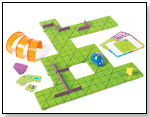|
|
Electronic Arts — a Very Subtle Transition Like all other leading video game publishers, Electronic Arts is caught between a rock and a hard place. The rock is the fact that games are increasingly played on non-traditional devices such as smart phones and tablets; the hard place is that the platforms for traditional gaming — the Xbox and Playstation — are at the end of their life cycle. This is how the U.S. brick-and-mortar market overall for video games is expected to perform until end of this year: 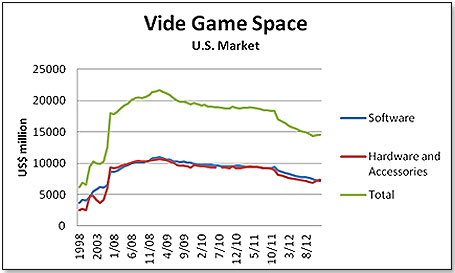 There is a slight uptick in the fourth quarter due to the release of the Wii U. There will be similar upticks next year as the PS4 and the Xbox 720 hit the market place. However, neither is expected to turn around the long-term decline in brick-and-mortar sales numbers. Both the new Xbox and the Playstation consoles are likely to branch out from being purely video game consoles – focusing on multimedia, movies and TV capabilities in addition to video games - and this may prolong their life span but will not change the course the boxed video games are on. However, this decline is not mirrored in the sales trend of digitally available games played over a variety of platforms. In fact, this is the one positive aspect in the otherwise very negative video game picture — digitally sold games have been in the upswing consistently over the past few years: 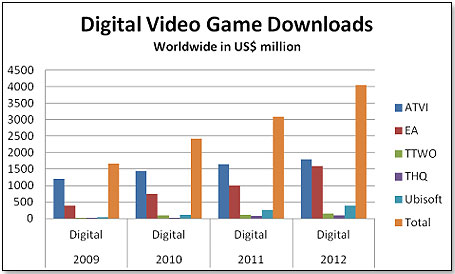 And now represent a very major portion of the sales of the leading video game publishers: 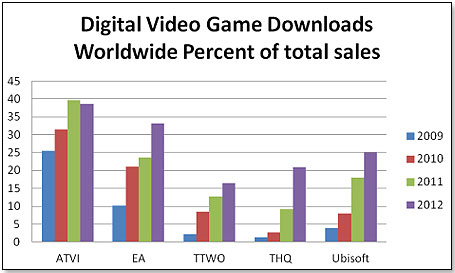 For Electronic Arts this is a trend that they want to ride all the way. In fact, EA’s Frank Gibeau recently predicted that the company will be 100% digital in the near future. While he did not say so explicitly, this strategy has any number of dramatic benefits for the company. One is, of course, that they are on a growth curve which by its very nature tends to be much more profitable in the long-term than defending an increasingly difficult position in a declining market. Equally importantly, being in the digital sphere dramatically cuts down on competition from pirated knock-offs. Also, there are no second-hand copies to be worried about and lastly, digital downloads that go directly to the consumer remove the middlemen and their 20% cut on the sales price. In fact, partly as a result of these factors, "mobile games are as profitable as console games because costs are in fact much less and revenues can be as much if not greater than a console game," Electronic Arts’ Nick Earle said in a CNBC interview. In order to achieve this transition from a situation where a majority of EA’s sales is in boxed products sold through brick-and-mortar retailers to one in which its business is totally digital, Electronic Arts is engaged in a very carefully phased change in emphasis. One aspect of this strategy is to dial back on new console and PC games — from 67 games in 2009 to a mere 22 games this year to 14 in 2013. On the other hand, the production of non-boxed games has skyrocketed and is expected to reach a new high next year. This is how EA’s new game output is expected to be segmented by category in 2013: 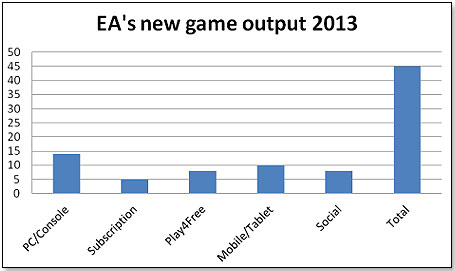 As this demonstrates, even though EA’s sales today are more than two-thirds in PC and Console sales, less than one third of the new games will next year be for these platforms. So, one major growth strategy is to focus on digital versus boxed products to the point that sometime in the future the latter will totally disappear. The other strategy is geographical. This is how the split looked at the end of the company’s last fiscal year: 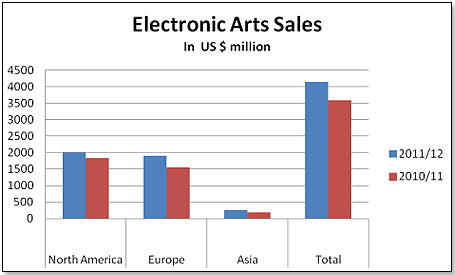 As we can see, slightly more than half of Electronic Arts’ sales are now made outside of North American. In and by itself, EA is not different in this if compared to its main competitors. However, where EA differentiates itself from its North American peers is by what they do elsewhere. Whilst the European market is very mature and market shares are fairly solidly set, Electronic Arts has recognized that significant video game markets are developing elsewhere and they have already taken steps to put their stakes down in them — the Indian Subcontinent and the Middle East. The only other company that has recognized the potential in these wild and wonderful countries and is doing something about it is Ubisoft.  It is easy to see why Electronic Arts is making these efforts. The Middle Eastern video game market alone is worth about half that of the United States and is growing at a very healthy clip. The market encompassing India, Sri Lanka and Bangladesh is estimated at $3 billion and is also growing in excess of 5% each year. At this point in time, Africa is not a very big video game market, but it is a very promising one. The best way to demonstrate this is to show how the various video game platforms have developed in South Africa, arguably Africa’s largest and most economically potent market:  This suggests that digital video games would find a ready home in South Africa. It also suggests that Electronic Arts has its product strategy right.  Writer's Bio: Lutz Muller is a Swiss who has lived on five continents. In the United States, he was the CEO for four manufacturing companies, including two in the toy industry. Since 2002, he has provided competitive intelligence on the toy and video game market to manufacturers and financial institutions coast-to-coast. He gets his information from his retailer panel, from big-box buyers and his many friends in the industry. If anything happens, he is usually the first to know. Read more on his website at www.klosterstrading.com. Read more articles by this author Writer's Bio: Lutz Muller is a Swiss who has lived on five continents. In the United States, he was the CEO for four manufacturing companies, including two in the toy industry. Since 2002, he has provided competitive intelligence on the toy and video game market to manufacturers and financial institutions coast-to-coast. He gets his information from his retailer panel, from big-box buyers and his many friends in the industry. If anything happens, he is usually the first to know. Read more on his website at www.klosterstrading.com. Read more articles by this author |
| ||||||||||||||||||||||||||||||||
Disclaimer Privacy Policy Career Opportunities
Use of this site constitutes acceptance of our Terms of Use.
© Copyright 2025 PlayZak®, a division of ToyDirectory.com®, Inc.


